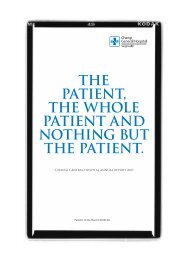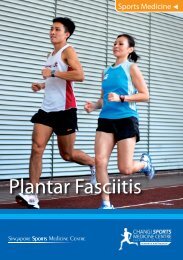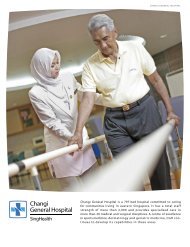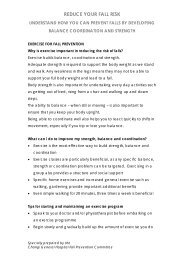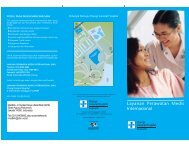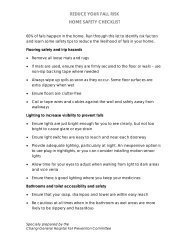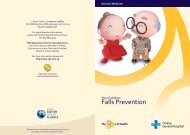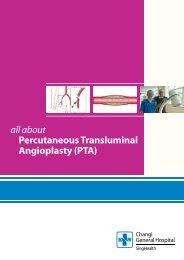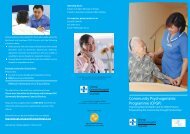Frozen Shoulder - Changi General Hospital
Frozen Shoulder - Changi General Hospital
Frozen Shoulder - Changi General Hospital
You also want an ePaper? Increase the reach of your titles
YUMPU automatically turns print PDFs into web optimized ePapers that Google loves.
Sports Medicine<br />
<strong>Frozen</strong><br />
<strong>Shoulder</strong><br />
CGH <strong>Frozen</strong> <strong>Shoulder</strong> 250809.indd 2<br />
8/26/09 1:29:11 PM
<strong>Frozen</strong> <strong>Shoulder</strong><br />
What is frozen shoulder?<br />
This is a condition in which the capsule of the shoulder joint becomes inflammed and<br />
thickened. This results in pain, stiffness and restriction of shoulder movement. This condition<br />
is also known as adhesive capsulitis. It is more common in women between the ages of<br />
40–65 years.<br />
clavicle<br />
shoulder<br />
capsule<br />
inflammed<br />
capsule<br />
scapula<br />
humerus<br />
Normal right shoulder (front view)<br />
<strong>Frozen</strong> right shoulder (front view)<br />
What are the symptoms?<br />
You may have frozen shoulder if you experience pain and stiffness when:<br />
1. Lifting your arm, either straight out in front or sideways.<br />
2. Rotating your arm, such as when unzipping the back of your dress or reaching for objects<br />
in your rear pocket.<br />
3. Shampooing and dressing.<br />
4. Sleeping on the affected shoulder.<br />
CGH <strong>Frozen</strong> <strong>Shoulder</strong> 250809.indd 3<br />
8/26/09 1:29:13 PM
What causes frozen shoulder?<br />
The exact cause is unknown. The condition has been linked to auto-antibodies that attack<br />
the joint capsule, resulting in inflammation, adhesion and eventual scar tissue formation. It<br />
may be triggered by injury (including surgery), degenerative changes in the joint, as well<br />
as viral illnesses. This condition is also more common in diabetics. Your shoulder may go<br />
through several stages as the scar tissue forms, with each stage lasting between three to six<br />
months:<br />
1. Freezing stage—you may experience ache and mild stiffness as the disease starts. Pain<br />
worsens as the condition progresses.<br />
2. <strong>Frozen</strong> stage—pain diminishes but stiffness increases. <strong>Shoulder</strong> movements can be<br />
severely restricted.<br />
3. Thawing stage—shoulder movement improves, and you will be able to do more<br />
activities. Complete resolution is the norm but up to 15% of patients may have remaining<br />
movement restriction or weakness.<br />
What will my doctor do?<br />
After a physical examination, an ultrasound scan and X-ray may be required to exclude<br />
other causes of pain. In the early stages, it may be difficult to tell it apart from other painful<br />
conditions affecting the shoulder.<br />
How is it treated?<br />
The disease will, unfortunately, have to run its course. The goal of treatment is to minimise<br />
pain and discomfort during the disease process and to restore full range of motion and<br />
strength by the end of its natural course. Your doctor may prescribe a course of antiinflammatory<br />
medication for symptom relief. Forceful manipulation should be avoided as<br />
this may worsen symptoms. Hydrodilatation of the joint may be required in severe cases.<br />
During this procedure, which is carried out under local anaesthesia, a small volume of sterile<br />
solution is injected into the joint to loosen the adhesions.<br />
CGH <strong>Frozen</strong> <strong>Shoulder</strong> 250809.indd 4<br />
8/26/09 1:29:13 PM
To maintain shoulder function, you are encouraged to perform the exercises shown. Each<br />
exercise should be performed at least twice a day. Application of a warm towel for 5–10<br />
minutes prior to exercise will reduce the discomfort. Exercise both shoulders, so that you can<br />
also maintain movement in the healthy shoulder. If there is increased pain after exercise, ice<br />
the painful part for 5-10 minutes.<br />
Range of motion (ROM) exercises<br />
Assisted Abduction<br />
Assisted<br />
internal rotation<br />
CGH <strong>Frozen</strong> <strong>Shoulder</strong> 250809.indd 5<br />
8/26/09 1:29:13 PM
Assisted<br />
forward flexion<br />
Scapular retraction<br />
CGH <strong>Frozen</strong> <strong>Shoulder</strong> 250809.indd 6<br />
8/26/09 1:29:14 PM
Stretches<br />
Cervical, chest & shoulder stretch<br />
Posterior Capsule Stretch<br />
CGH <strong>Frozen</strong> <strong>Shoulder</strong> 250809.indd 7<br />
8/26/09 1:29:14 PM
What is my prognosis?<br />
Many people with frozen shoulder regain full use of their shoulder after the condition has<br />
run its course. However, this may take 6–18 months from the onset of symptoms, and there<br />
may be some remaining pain and stiffness. Recurrence, either in the same shoulder or the<br />
other side can happen.<br />
The <strong>Changi</strong> Sports Medicine Centre (CSMC) is the largest multi-disciplinary<br />
Sports Medicine centre in Singapore. Our Sports Physicians, Sports Orthopaedic<br />
Surgeons, Sports Physiotherapists, Exercise Physiologist, Sports Trainers, Dietitians,<br />
and Podiatrists cater to both recreational and competitive athletes. CSMC’s services<br />
include the treatment of sports injuries, injury prevention, pre-participation<br />
screening, performance enhancement, exercise testing, exercise prescription, weight<br />
management, and sports event medical coverage.<br />
The Singapore Sports Medicine Centre (SSMC) is an alliance between the <strong>Changi</strong> <strong>General</strong> <strong>Hospital</strong><br />
and the Singapore Medical Group. Conveniently located at Novena Medical Centre, SSMC is a<br />
one-stop private clinic for the management and treatment of sports injuties. Providing the same<br />
services as CSMC, SSMC is led by its Medical Director, Dr Ben Tan, who is also Head and Senior<br />
Consultant Sports Physician at CSMC.<br />
CGH <strong>Frozen</strong> <strong>Shoulder</strong> 250809.indd 8<br />
8/26/09 1:29:14 PM
For appointments and enquiries,<br />
please call the CGH Appointment Centre at<br />
Tel: (65) 6850 3333<br />
CGH Appointment Centre operating hours:<br />
8.30 am to 8.00 pm (Monday to Friday)<br />
8.30 am to 12.30 pm (Saturday & Sunday)<br />
Closed on Public Holidays<br />
For more information, please visit<br />
http://www.cgh.com.sg<br />
2 Simei Street 3 Singapore 529889<br />
Tel: 6788 8833 Fax: 6788 0933 www.cgh.com.sg<br />
Reg No 198904226R<br />
F<br />
S<br />
All information is valid at the time of printing (September 2009)<br />
and subject to revision without prior notice.<br />
CGH <strong>Frozen</strong> <strong>Shoulder</strong> 250809.indd 1<br />
8/26/09 1:29:07 PM




